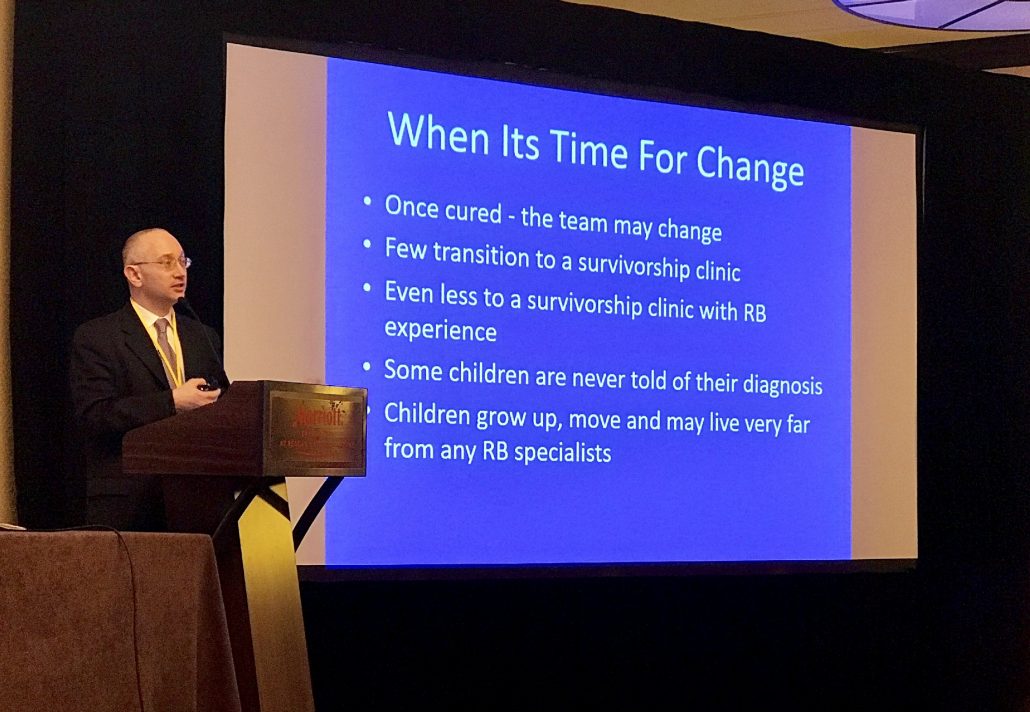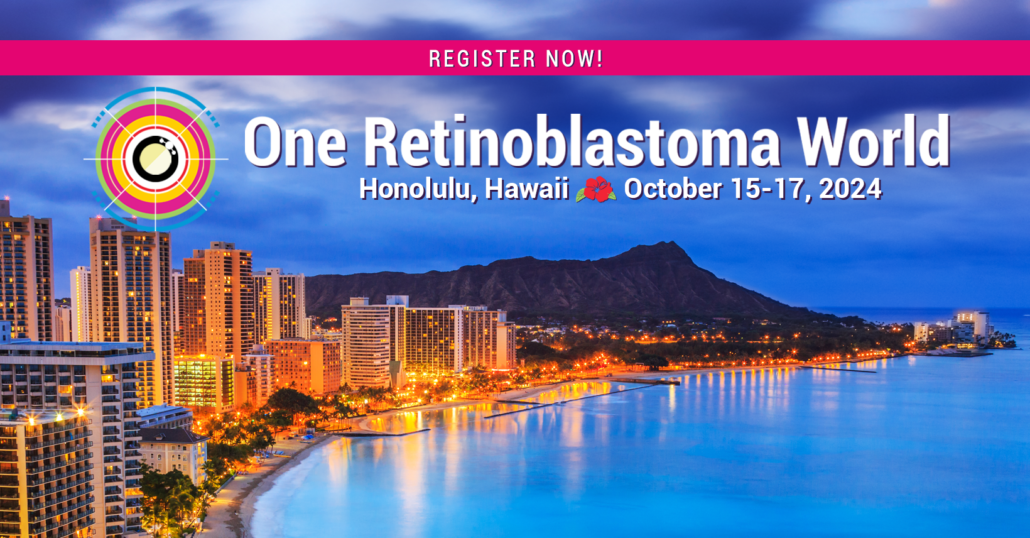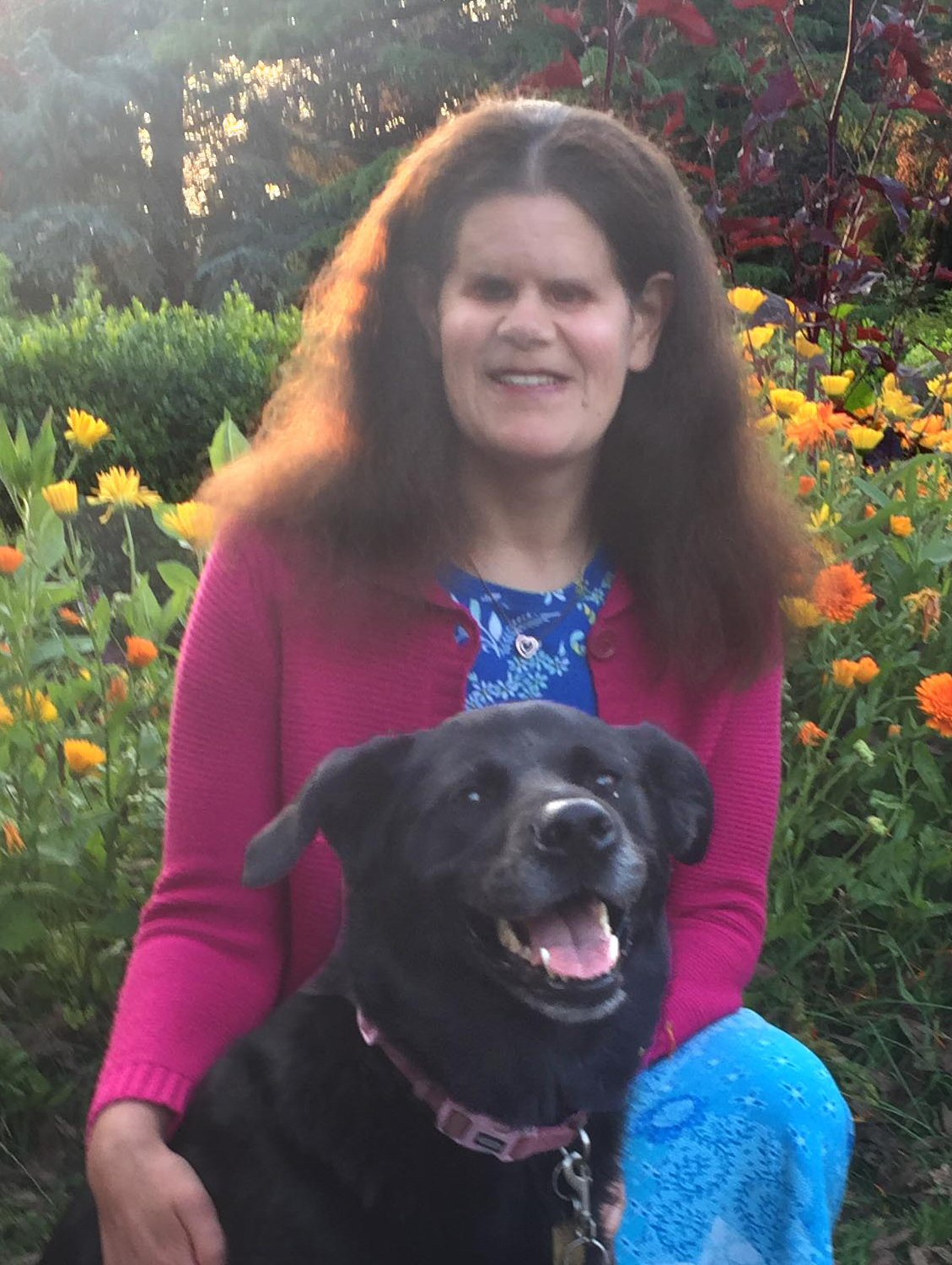Retinoblastoma Survivorship at One Rb World
Monday September 11, 2023
Retinoblastoma is a complex cancer with potentially significant and serious lifelong impacts for the survivor and all family members. Sessions at every One Rb World explore the risks and challenges survivors and families encounter beyond childhood eye cancer, and how we can improve comprehensive survivorship care throughout life. Below, we share sessions from the 2017, 2020, and 2021 meetings.
Dan Gombos MD, ocular oncologist and Chief of Ophthalmology at MD Anderson Cancer Center, leads a survivorship session at One Rb World 2017 in Washington D.C.
One Retinoblastoma World
Retinoblastoma is a highly curable eye cancer of infancy and early childhood, however, survival rates vary dramatically between developed and developing countries. Many children worldwide lose sight due to delayed diagnosis.
Early diagnosis, access to specialist care during childhood and throughout life, and family and survivor support form a critical triad in the care and cure of all patients. These three factors guide all discussions at One Retinoblastoma World.
The One Rb World conference engages eye and cancer specialists, researchers, parent and survivor advocates from around the world to pursue the best possible care for all children, survivors and their families. This interactive meeting encourages collaboration among the multi-disciplinary delegation, and rigorous international multi-center research that addresses patient priorities. This will ultimately lead to greater knowledge and scientific evidence; improving survival, vision outcomes and psychosocial care.
For more information, visit our One Rb World microsite.
Why is Survivorship Care Important?
Long-term survivorship care is important after treatment of childhood eye cancer for a number of reasons, both medical and psychological. Care is important for the survivor, their family, and for their future children.
Children are very young when diagnosed with retinoblastoma. Treatment and follow-up care involves many invasive medical procedures repeated frequently over at least three years – often far longer. Without effective psychological support alongside the initial treatment, both children and parents can become quickly overwhelmed by their experience, increasing the risk for trauma and mental health problems that may linger throughout life.
Survivors treated with chemotherapy and radiotherapy have increased risk of second primary cancers and other health concerns. All treatments have some impact on vision, requiring life-long follow up care.
Individuals with a heritable RB1 pathogenic allele have an increased risk of developing second primary cancers throughout life, and their children have a 50% risk to inherit the gene carrying increased risk for retinoblastoma. Comprehensive follow up care for these individuals is particularly important.
Below, we have gathered together twelve sessions from three One Rb World meetings, focused on various aspects of retinoblastoma survivorship. They include 33 talks, presentations and panel discussions, sharing professional and lived experiences. Presentation details and timestamps are included below each video.
One Rb World 2017
Our One Retinoblastoma World 2017 conference was held in Washington D.C., USA. The event was hosted by World Eye Cancer Hope at Crystal City Marriott (Arlington, VA) on October 9 to 11.
Questions commonly asked by parents and survivors inspired each session.
Psychosocial Outcomes Panel Discussion
Question
Retinoblastoma generates unique medical and psychosocial needs as developmental milestones throughout a person’s lifetime are simultaneously impacted. What research is currently being done into psychosocial impacts and PTSD in diagnosed children, parents and adult survivors throughout their life, and how can we be involved to share our experience?
Session Lead
Marissa Gonzalez, Retinoblastoma Survivor, President and Founding Director, WE C Hope USA.
Speakers
- Melissa Mills MS, CGC, LGC, Genetic Counselor, Lucile Packard Children’s Hospital, Stanford, California, USA; retinoblastoma survivor.
- Len Burns, LMFT, Santa Clara, California; retinoblastoma survivor.
Screening for Survivors
Question
What recommendations do you have for long term follow up care and screening in RB1 mutation carriers and children treated with chemotherapy / radiotherapy? How can you help us educate our primary doctors so they take us seriously, and what can we do if we have no access to a survivor / follow-up program?
Session Lead
Dan S. Gombos MD FACS Professor & Chief, Section of Ophthalmology, MD Anderson Cancer Center Clinical Co-Director, The Retinoblastoma Center of Houston
1:25 – Second Tumors in the RB Population: Which Tumors and When?
Ruth Kleinerman, M.P.H, Ph.D. Epidemiologist, National Cancer Institute, NIH, Rockville, Maryland Deputy Branch Chief, Radiation Epidemiology Branch, NCI, NIH, Rockville, Maryland.
9:30 – Cancer Survivorship Clinic: Who Should be Referred and Why?
David R. Freyer, D.O., M.S. Director, Survivorship & Supportive Care Program, Children’s Center for Cancer and Blood Diseases, Children’s Hospital Los Angeles, Los Angeles, California Professor of Clinical Pediatrics and Medicine, Keck School of Medicine, University of Southern California, Los Angeles, California.
23:40 – Brain Tumors: Who, When and How to Screen.
Katherine Paton, M.D., FRCSC Clinical Professor of Ophthalmology, The University of British Colombia, Vancouver General Hospital; British Colombia Children’s Hospital, Vancouver, Canada Head, Ocular Oncology & Director of Diagnostic Ophthalmic Ultrasound Imaging, University of British Columbia, Vancouver, Canada.
39:20 –The Adult with Distant History of Retinoblastoma: Practical Tips for Your Primary Care Provider
Dan S. Gombos MD
One Retinoblastoma World 2020
Our One Retinoblastoma World 2020 conference was held virtually on October 3 and 4, 2020. The event was hosted jointly by World Eye Cancer Hope, the International Retinoblastoma Consortium, Canadian Retinoblastoma Research Advisory Board, and Canadian Retinoblastoma Society.
Psychosocial Impacts on Retinoblastoma Survivors and Families
Retinoblastoma treatment and survivorship comes with many challenges. For example, prolonged hospital stays, loss of an eye or vision, aggressive therapies, frequent appointments or long-distance travel can add undue stress on the child and their family. This can have downstream effects on the overall wellbeing of patients, siblings, parents, and even extended family.
This session discussed the family and survivor experiences and the need for culturally-competent social, emotional, and psychological support to retinoblastoma patients, survivors, parents and families throughout their retinoblastoma journey.
Session co-Leads: Elva Tamashiro and Monika König.
02:05 – Psychosocial and Emotional Aspects of Retinoblastoma: Stages of Support
Elva Tamashiro, MS, Child Development and Family Specialist, Children’s Hospital Los Angeles, Los Angeles, USA.
13:35 – Personal Survivor Story
Natalia Frasunkiewicz, MSW, Retinoblastoma Survivor, Toronto, Canada.
22:45 – Discussing Retinoblastoma With Your Child
Monika König, Founder & Chairman of the Board of Trustees, KinderAugenKrebsStiftung; Parent of Retinoblastoma Survivor, Stuttgart, Germany.
35:40 – Psychosocial care for patients with retinoblastoma in Kenya (Kenyatta National Hospital).
Philip Odiyo, PhD, Patient Support Manager, Faraja Cancer Support Trust, Nairobi, Kenya.
Retinoblastoma Survivorship and Second Cancer Screening
Retinoblastoma survivorship is a life-long journey, with obstacles both large and small that can challenge survivors both mentally and physically.
This session explored four major components of survivorship: how to be your own advocate for your health and well-being; learning about secondary cancer risks resulting from retinoblastoma; the role an ocularist plays in the life of a survivor with prosthetic eyes; and the strength that can be gained from hearing fellow survivors’ stories, highlighting the importance of a community for survivors and families worldwide.
Session co-Leads: David Freyer and Marissa Gonzalez
02:55 – Navigating the Post-Retinoblastoma Survivorship World
Marissa D. Gonzalez, President and Founding Board Member, World Eye Cancer Hope USA; Retinoblastoma Survivor, Los Angeles, USA.
14:35 – Survivorship Care After Retinoblastoma
David R. Freyer, DO, MS, Director, Survivorship and Supportive Care Program, Children’s Hospital Los Angeles, USA; Director, Cancer Survivorship Program and Co-Director, Adolescent and Young Adult Cancer Program, University of Southern California Norris Comprehensive Cancer Center; Professor of Clinical Pediatrics and Medicine, Keck School of Medicine, University of Southern California, Los Angeles, USA.
31:50 – Personal Survivor Story
Clayonia Colbert-Dorsey, Retinoblastoma Survivor, Maryland, USA.
42:50 – The Role of the Ocularist in the Retinoblastoma Patient Journey.
Matthew Milne, BCO, BADO, Ocularist, Milne Ocular Prosthetics, Toronto, Canada; Consultant Staff, Ophthalmology, The Hospital for Sick Children (SickKids), Toronto, Canada.
Retinoblastoma and Vision
A patient’s retinoblastoma treatment can have an impact on their vision. This session addresses questions such as: What are the long-term outcomes of treatment on vision? How does vision mature when someone has one eye? What research is being done on visual impairment in retinoblastoma survivors?
Session co-Leads: Jennifer K. E. Steeves & Michel Ongaro.
01:27 – Vision Following Long-Term Loss of One Eye.
Jennifer K. E. Steeves, PhD, Professor, York University, Toronto, Canada.
12:40 – Hearing Following Long-Term Monocular Enucleation.
Stefania S. Moro, PhD, Research Scientist, York University, Toronto, Canada.
22:55 – Adaptations to Monocularity and Low Vision: Some Practical Lessons from Science.
Esther G. González, MA, PhD, Assistant Professor, Ophthalmology & Vision Sciences, University of Toronto, Toronto, Canada.
34:50 – Visible and Invisible: Lived Experience After Loss of an Eye
Sarah A. Johnson, PhD, Assistant Professor, Center for Neurodegenerative Disease and Therapeutics, Rosalind Franklin University, Chicago, USA; Retinoblastoma Survivor.
48:10 – Personal Survivor Story
Michel Ongaro, Musician, Bilateral Retinoblastoma Survivor, Nairobi, Kenya.
One Retinoblastoma World 2021
Our One Retinoblastoma World 2021 conference was held virtually on October 1 to 3, 2021. The event was hosted by World Eye Cancer Hope, with organizing team members in the USA and Australia – who will co-host our 2024 meeting in Honolulu, Hawaii (the location planned for 2021).
Day One Welcome Remarks and Keynote
08:10 – Survivor Keynote
Cheryl Newman, Retinoblastoma Survivor and Parent, Victoria, Australia.
Survivor Panel
Hear from three survivors from three continents and learn about their experiences with retinoblastoma through adolescence and adulthood.
00:00 – Introductions and Personal Story
Marissa D. Gonzalez President and Founding Board Member, World Eye Cancer Hope USA; Retinoblastoma Survivor, Los Angeles, California, USA.
05:18 – Genevieve’s Story
Genevieve Savoie, Retinoblastoma Survivor, Toronto, Ontario, Canada.
24:43 – Finding a Survivors Community
Kieran Donovan, Retinoblastoma Survivor, Edinburgh, Scotland, UK.
35:22 – Cheryl Newman
Retinoblastoma Survivor, Wodonga, Victoria, Australia.
45:00 – Q & A
Moderator: Sandra E. Staffieri, BAppSc(orth), PhD Retinoblastoma Care Coordinator, Royal Children’s Hospital, Victoria, Australia; Research Fellow/Clinical Orthoptist, Centre for Eye Research Australia, University of Melbourne, Melbourne, Australia.
Survivorship and Second Cancer Risk
Learn about second cancer risks and the importance of finding a survivorship clinic for life-long care.
00:00 – Introductions
Marissa D. Gonzalez President and Founding Board Member, World Eye Cancer Hope USA; Retinoblastoma Survivor, Los Angeles, California, USA.
01:15 – Survivorship Care After Retinoblastoma
David R. Freyer, DO, MS Director, Survivorship and Supportive Care Program, Children’s Hospital Los Angeles; Director, Cancer Survivorship Program and Co-Director, Adolescent and Young Adult Cancer Program, University of Southern California Norris Comprehensive Cancer Center; Professor of Clinical Pediatrics and Medicine, Keck School of Medicine, University of Southern California, Los Angeles, California, USA.
26:27 – Welcome to Survivorship
Yasmeen Khan, PA USC Norris Comprehensive Cancer Center, Los Angeles, California, USA.
39:10 – Q & A
Moderator: Marissa D. Gonzalez
Day Two Welcome Remarks and Survivor Keynote
03:18 – Survivor Keynote
Sarah Yang, Retinoblastoma Survivor, Melbourne, Victoria, Australia.
Photo Collage Presentation
Check out what survivors around the world love to do!
Narration by Sarah Yang, Retinoblastoma Survivor.
Taking Care of Our Mental Health
Why is preserving positive mental health from diagnosis through to adult survivorship in patients, parents, and families important and how can we support it? How and why do we as clinicians need to look after ourselves too?
00:00 – Introductions
Sandra E. Staffieri, BAppSc(orth), PhD, Retinoblastoma Care Coordinator, Royal Children’s Hospital, Victoria, Australia; Research Fellow/Clinical Orthoptist, Centre for Eye Research Australia, University of Melbourne, Melbourne, Australia.
00:43 – Preserving Positive Mental Health
Pernille Gregersen, Senior Consultant, Clinical Geneticist, Department of Clinical Genetics, Aarhus University Hospital, Aarhus, Denmark.
11:52 – Mental Health Strategies: A Family Affair
Olivia Larkens, Certified Child Life Therapist, Royal Children’s Hospital, Melbourne, Victoria, Australia.
32:56 – It’s The Little Things…
Grace Dillon, Retinoblastoma Survivor, Student, Brisbane, Queensland, Australia.
Day Three Welcome Remarks and Keynote
05:13 – Survivor Keynote
Clayonia Colbert-Dorsey, Retinoblastoma Survivor, Washington, USA.
Final Words
Retinoblastoma is a complex cancer with potentially significant and serious lifelong impacts for the survivor and all family members.
Psychological supports are vital from diagnosis, throughout treatment, and beyond to protect and enhance quality of life. Finding an understanding community and shared experience can aid a sense of belonging, confidence, and healing.
Understanding more about how retinoblastoma can lead to medical trauma and poor mental health can empower better mental health care for survivors and families, and preventive supports for retinoblastoma patients and their families.
Second cancers are the most serious lifelong health concern for many survivors. Empowering survivors to understand their own risk and advocate for their healthcare is vital, as is providing appropriate survivorship care and second cancer screening.
These sessions all highlight the importance of national and global collaboration to increase the evidence needed to improve survivorship care. As an international community of retinoblastoma and survivorship specialists, families, survivors, scientists, and other advocates, we can work together to answer difficult questions, overcome challenges of rarity, and create the best survivor care possible.
With sincere gratitude to everyone who contributes to the survivorship discussion at One Rb World, to active research, and partnerships that advance survivor knowledge, empowerment, and care. Your commitment to our community saves lives and minds, and gives us all hope.
Aloha One Retinoblastoma World 2024!
Please join us in Honolulu, Hawaii for One Rb World 2024, Tuesday 15 – Thursday 17 October, 2024. The meeting will be held just before the International Society of Paediatric Oncology World Congress which takes place Thursday 17 – Sunday 20 October, 2024 at the Honolulu Convention Center.
We look forward to sharing more conversation, knowledge, experience, and support. Three days of networking and collaboration to advance care for every child, survivor, and family. All professionals, scientists, families, survivors and children welcome – there’s a full program for kids too! Visit our conference microsite for more details.
You May Also Like…
One Rb World 2021: Planning, Creating, Sharing and Raising Hope Together
On 1-3 October, we hosted a hope-filled One Rb World 2021 meeting. Planning and hosting is always an adventure, and the 6th One Rb World was especially so! Co-Chairs, Dr. Sandra Staffieri PhD, Rb Care Co-Ordinator, Royal Children’s Hospital, Melbourne, Australia, and Marissa Gonzalez, Bilateral Rb Survivor and President, World Eye Cancer Hope USA, share behind-the-scenes insight and conference highlights.
One Rb World 2020: Inspiring Global Support, Research and Action.
In October, a diverse community of survivors, families and medical professionals came together at One Retinoblastoma World for two days of inspiring panels, research and calls to action. WE C Hope USA President Marissa D. Gonzalez shares a recap of the fifth global conference, and her vision for next year’s event in Hawaii.
Reflecting on One Rb World 2017
Washington D.C. hosted the 4th One Rb World meeting on October 9 – 11, 2017, including the first US National Family & Survivor Day. WE C Hope USA President, Marissa Gonzalez, reflects on her experience planning and hosting the event, and what the One Rb World community means to her.
Ethnography: A New Frontier in Retinoblastoma Research
Every child with retinoblastoma, parent, sibling, survivor, and medical professional has a story to tell of their journey through childhood eye cancer. Understanding our individual and collective experience empowers us to develop and deliver holistic care for all. Rb survivor and WE C Hope USA Director, Clayonia Colbert-Dorsey discusses the growing field of ethnography research, and how it can positively impact our diverse global community.
About the Author
Abby’s father was diagnosed with bilateral retinoblastoma in Kenya in 1946. Abby was also born with cancer in both eyes. She has an artificial eye and limited vision in her left eye that is now failing due to late effects of radiotherapy in infancy.
Abby studied geography at university, with emphasis on development in sub-Saharan Africa. She co-founded WE C Hope with Brenda Gallie, responding to the needs of one child and the desire to help many in developing countries. After receiving many requests for help from American families and adult survivors, she co-founded the US chapter to bring hope and encourage action across the country.
Abby enjoys listening to audio books, creative writing, open water swimming and long country walks.






Leave a Reply
Want to join the discussion?Feel free to contribute!